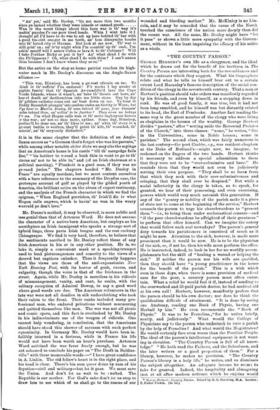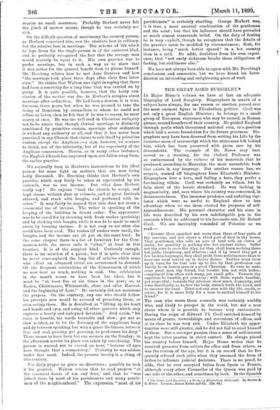"THE COUNTRY PARSON."
GEORGE HERBERT'S own life as a clergyman, and the ideal which he draws out for the benefit of his brethren in The Country Parson are interesting both for the resemblances and for the contrasts which they suggest What his biographers relate and what he tells us himself bear out to a certain extent Lord Macaulay's famous description of the social con- dition of the clergy in the seventeenth century. That a man of Herbert's position should take orders was manifestly regarded by his friends, and even by himself, as a stepping down in rank. He was of good family, it was true, but it had not been long ennobled, and he himself was but distantly related to its head, the Earl of Pembroke. Another fact tending the same way is the great number of the clergy who were living as chaplains in the houses of the wealthy. George Herbert divides "pastors," after "Betting aside the Reverend Prelates of the Church," into three classes : "some," he writes, "live in the Universities ; some in Noble houses ; some in parishes." The second class, which was fairly numerous in the last century—the poet Crabbe, e.g., was resident-chaplain at the Duke of Rutland's—might now, we imagine, be reckoned on the fingers of the two hands. Herbert thinks it necessary to address a special admonition to them that they were not to be "over-submissive and base." He reminds them that they would not even be judiciously serving their own purpose. "They shall be so fan* from that which they seek with their over-submissiveness and cringing, that they shall ever be despised." But while a social inferiority in the clergy is taken, so to speak, for granted, we hear of their possessing, and even exercising, powers which would very much astonish this generation. If any of the "gentry or nobility of the parish make it a piece of state not to come at the beginning of the service," Herbert counsels the parson to urge his churchwardens to "present them "—i.e., to bring them under ecclesiastical censure—and "if the poor churchwardens be affrighted of their greatness" to perform that office himself. Can we imagine the outcry that would follow such zeal nowadays? The parson's general duty towards his parishioners is conceived of much as it might be now. Attention to the sick, however, is made more prominent than it would be now. He is to be the physician of the sick, or, if not he, then his wife must perform the office. He is instructed, indeed, to look in her for no worldly accom- plishments but the skill of "healing a wound or helping the sick." If neither the parson nor his wife are qualified, then they should have "a young practitioner in the house for the benefit of the parish." This is a wish which even in these days, when there is some provision of medical care for the poor, a country parson must often enter- tain. What a relief he would feel it if, instead of sending to the overworked and ill-paid parish doctor, he had medical aid at his own call ! Herbert, however, manifestly prefers that the parson should be his own doctor; nor does he think the qualification difficult of attainment. "It is done by seeing one Anatomy, reading one Book of Physic, having one Herball by him." He even recommends the "Book of Physic." It was to be Fernelitm," for he writes briefly, neatly, and judiciously." What would the College of Physicians say to the parson who undertook to cure a parish by the help of Fernelius P And what would the Magistrates ? He would certainly fare even worse than the Peculiar People. The ideal of the parson's intellectual equipment is not want- ing in elevation. "The Country Parson is full of all know- ledge." "He bath read the Fathers, and the Schoolmen, and the later writers or a good proportion of them." For a library, however, he makes no provision. "The Country Parson's library is a holy life," he writes, and so dismisses the subject altogether. An adequate income he seems to take for granted. Indeed, the hospitality and almsgiving (not at all after modern notions) which he enjoins would • George Herbert : Country Parson. Edited by H. O. &wham, M.A. London:
T. Fisher Unwin. 6d.1 require no small resources. Probably Herbert never felt the pinch of narrow means, though he was certainly not rich.
On the difficult question of matrimony the country parson, as Herbert conceived him, saw the absolute best in celibacy, but the relative best in marriage. The scheme of life which he lays down for the single parson is of the ansterest kind, and he probably recognised the fact that the average man would scarcely be equal to it. His own practice was to prefer marriage, but in such a way as to show that it was rather for the general benefit than to please himself. Mr. Beeching relates how he met Jane Danvers and how "the marriage took place three days after their first inter- view." He thinks that Walton was right in saying that there had been a courtship for a long time that was carried on by proxy. It is quite possible, however, that the hasty con- clusion of the matter was due to Herbert's scruples about marriage after ordination. He had been a deacon, it is true, for some three years, but when he was pressed to take the living of Bemerton by counsellors to whom be could not refuse to listen, then he felt that if he was to marry, he must marry at once. He was too well read in Christian antiquity not to be aware that though clerical marriage is distinctly sanctioned by primitive custom, marriage after ordination is without any authority at all, and that it has never been practised in any Church that claims to rule itself by primitive custom except the Anglican ;—a sign, however, we venture to think, not of the inferiority, but of the superiority of the Anglican communion. Herein, as in many other instances, the English Church has improved upon, not fallen away from, the earlier practice.
We naturally turn to Herbert's instructions to his ideal parson for some light on matters that are now being hotly discussed. Mr. Beeching thinks that Herbert's own practice, which may fairly be taken as represented by his counsels, was to use incense. But what does Herbert really say ? He enjoins "that the church be swept, and kept cleane without dust or cobwebs, and at great festivals strewed, and stuck with boughs, and perfumed with in- cense." It may fairly be argued that this does not mean a ceremonial use of incense. The writer is speaking of the keeping of the building in decent order. The appearance was to be cared for by strewing with fresh rushes (probably) and by sticking with boughs, while it was to be made to smell sweet by burning incense. It is not easy to see what else could have been used. The rushes (if rushes were used), the boughs, and the incense are all put on the same level. In the same chapter there is a list of furniture for the Com- munion-table (he never calls it "altar," at least in this treatise). It is of the simplest kind. Curiously enough, there is no mention of a paten ; but it is quite clear that he never contemplated the long list of articles which some who affect an advanced ritual are accustomed to demand. Of the frequent celebrations of the Communion of which we now bear so much, nothing is said. One celebration in the month seems to have been his ideal, but it must be "at least five or six times in the year ; as, at Easter, Christmasse, Whitsuntide, afore and after Harvest, and the beginning of Lent." He certainly did not monotone the prayers. On the contrary, any one who should follow his precepts now would be accused of preaching them, or even acting them. He is described as "lifting up his heart and hands and eyes, and using all other gestures which may expresso a hearty and unfeyned devotion." And again, "his voice is humble, his words treatable and slow ; yet not so slow neither, as to let the fervency of the supplicant hang and fly between speaking, but with a grave livelinesse, between fear and zeal, pausing yet pressing, he performes his duty." There seems to have been but one sermon on the Sunday ; in the afternoon service its place was taken by catechising. The parson is warned not to exceed an hour, "because all ages have thought that a competency." Probably he was seldom under that mark. Indeed, the present brevity is a thing of this century.
For daily prayer he gives no directions ; possibly he took it for granted. Walton relates that he read prayers "at the canonical hours of ten and four," and that he "was joined there by most of his parishioners and many gentle- men of the neighbourhood." The expression "most of his parishioners" is certainly startling. George Herbert was, it is true, a most unusual combination of the gentleman and the saint ; but that his influence should have prevailed so much almost transcends belief. On the duty of fasting he is very explicit, though he recognises that the details of the practice must be modified by circumstances; flesh, for instance, being "much better spared" in a hot country than in a cold. He adds, doubtless from his own experi- ence, that "not onely sicknesse breaks these obligations of fasting, but sicklinesse also."
We have not always been able to agree with Mr. Beeching's conclusions and comments, but we have found his Intro duction an interesting and enlightening piece of work







































 Previous page
Previous page